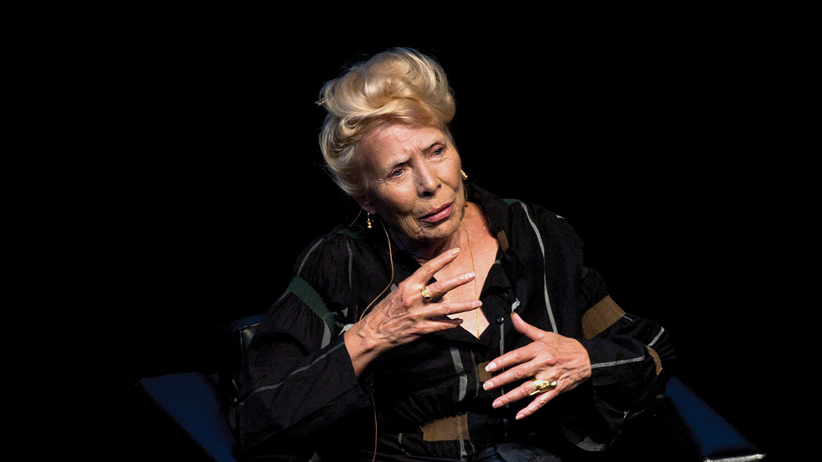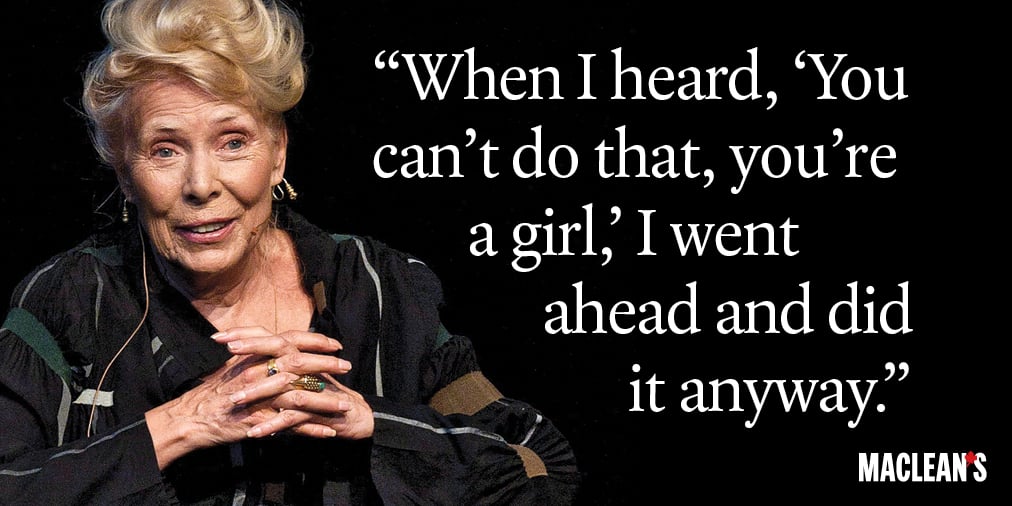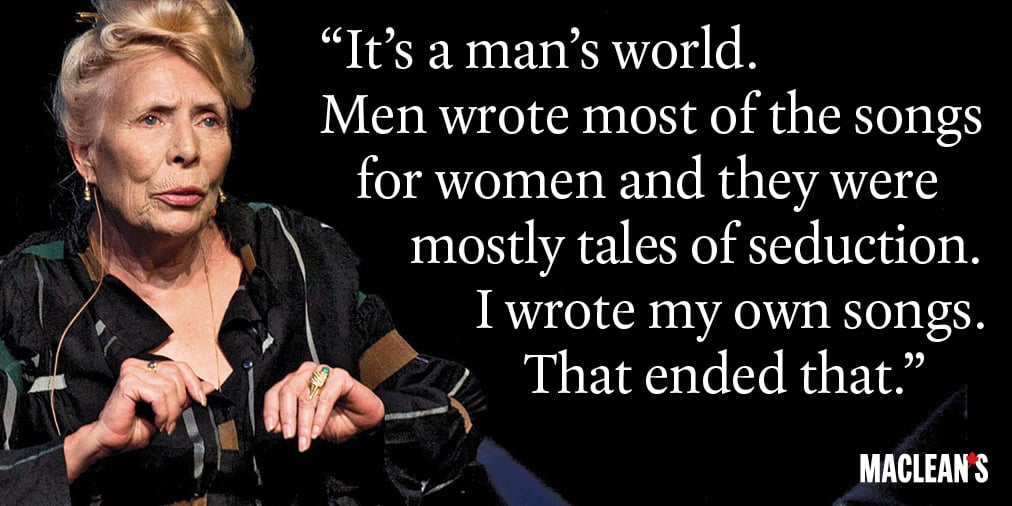The Interview: Joni Mitchell
From 2014: Singer-songwriter Joni Mitchell on Georgia O’Keeffe, the Kardashians, the men she loved and her life in B.C.
Joni Mitchell speaks at the Isabel Bader theatre as part of Luminato festival, Sunday, June 16, 2013. THE CANADIAN PRESS/Galit Rodan
Share

In a rare and wide-ranging interview spanning 90 minutes, singer-songwriter-artist Joni Mitchell spoke from her home in Los Angeles. Her latest project [released in 2014], a box set called Love Has Many Faces: A Quartet, a Ballet, Waiting To Be Danced, combines her experience as a Grammy-winning musician, a painter and a dance enthusiast by collecting 53 songs into four discs from 40 years of recording.
Q: You just celebrated your 71st birthday in L.A. at the Hammer Museum. Were you happy with the way the tribute went?
A: It was wonderful but now I’ve got laryngitis because I partied too hard—for three days straight.
Q: You once said it was painful to go back and relive your work. This project had you reviewing 40 years of work. Was it distressing?
A: I thoroughly enjoyed it. I had a hard time condensing what I wanted to say into one act [or disc]. In that form, the story lacked nuance. Four acts [on four discs] was a challenge but I was lit up to do this.
Q: So what was the motivation this time around?
A: The war ballet [Fiddle and the Drum, performed by the Alberta Ballet Company in 2007] was so well received—especially by men. It was suspenseful, rude and rowdy. Cowboys threw their hats in the air and screamed, “Yahoo!”
Q: Debussy and Duke Ellington are the gold standard you’ve always wanted to get to. Can you say you have reached this bar?
A: No, not at all. I would hate to reach that bar because I wouldn’t be able to listen to anything I’ve done. At least I have some things that I am in awe of.
Q: You’ve always produced yourself. Why?
A: Producers don’t go for something new. For example, on the song Number One, I heard the groove in my head and a very long brush . . . “shhhh-chchchc.” I couldn’t find it and the drummers couldn’t give it to me. One night at the end of a session, the tape was rolling off the heads and made the sound. I went, “That’s it.” I always look for the driving wheel of the feel of a piece of music. Sometimes that wheel finds me.
Q: You’ve long been preoccupied with tapping into what you call the “theatre of a song.” Can you explain what that means?
A: They are all stories. I have to deliver the lines with the right read. I feel like Marlon Brando. He [brought] credibility to the dialogue. God, when I hear people cover the song River with a smile on their face—and you can hear the smile—that is so wrong for the theatre of the song. It’s melancholy. If you are singing it with a smile, it means you’re just a singer, not a performer.
Q: You’ve voiced concern over what you call the “push-button generation of today.” What is impairing us the most?
A: Everything is about channel changing. It has ruined attention spans. I spaced out in school but I didn’t develop attention-deficit issues because I placed attention on my imagination and ignored the curriculum. I didn’t have a million newsfeeds to contend with. It is just like when I have people over to my house to watch a film—it’s like living in a Robert Altman movie! They are always talking over each other. We are all losing the plot. It’s an addiction to phones and too much information.
Q: What repercussions do you think future generations will feel now that everyone is on their phone during concerts, etc.?
A: Here’s an example. My grandson and I were sailing on a boat and he said, “It’s boring.” I asked, “How can you say it’s boring? The sun is shining, we’re going across the water so fast . . . ” And he said, “Not fast enough.” Technology has given him this appetite.
Q: Speaking of which, you’ve been smoking since age nine—which is its own unhealthy addiction. Ever tried to stop?
A: It is a clarity drug for me. If I couldn’t smoke, that would take away my attention. I would be scattered.
Q: The University of Lincoln has a call-out for essays about your work. What recordings caused the most change?
A: I get letters from people that give me some idea of how the songs go into their life. The interesting ones are life-changing. Malka [Marom, co-author of Joni Mitchell: In Her Own Words,] having heard I Had A King, went home that night and left her husband. Most of the time [my music] is a pleasant distraction.
Q: In Borderline you write about a world “prickling with pretention.”
A: The song investigates why people divide. In Japan, they have a pecking order of smart and dumb according to blood. A man asked me what my blood type is because he thought I was A-type—which he said was “smart blood.” It is human nature to pull rank one way or another. By principle or blood type.
Q: John Lennon told you that parts of your album Court and Spark were a product of “over-education.”
A: That’s a class difficulty he had. He’s a working-class lad. I’m sure he had that same fight with [producer] George Martin because he was afraid that he was betraying his class. I know I’m going to get into hot water if I get into this but I have controversial opinions about him. I watched this [English film], which was a roundup of the best musicians of the 20th century. As soon as it hit my era, the intelligence of it dropped considerably. When it came to me, this guy folded his arms and crossed his feet and said, “I never liked Joni Mitchell—she’s too twee.” Well, that’s what John Lennon was like. It was that fear working-class people have of middle-class people.
Q: Unlike many, you feel compassion for Hollywood stars trapped by their fame and often quote a poem called The Fishbowl, which you wrote when you were 16. When you see reality-TV shows such as Keeping Up With The Kardashians, is that empathy still there?
A: I wouldn’t watch that show. Ever. They are asking for it. That’s a whole other ball game. They want it and they are thick-skinned and they don’t care whether they look good or bad. I felt sorry for celebrities with talent when I wrote that poem; Sandra Dee was breaking up with Bobby Darin and all the magazines had pictures of her with mascara running down her face, all paparazzied out.
Q: The poem has a line about “the gilded bait” of fame that so many of these stars desired. Did you ever feel like you took the bait?
A: No. I’ve never been very ambitious. I never felt like I had any talent. I was a painter but the musical and writing gift hadn’t come in—even though that poem is pretty precocious.
Q: I imagine Chinese Café would be one of the toughest songs to revisit for this box set. The lyrics—“My child’s a stranger / I bore her / But I could not raise her”—speak to your daughter.
A: That’s before she came back. I was a little more romantic. When we were reunited in [2000], wow, I had my hands full. We’ve worked through everything now. We’ve become this funny little dysfunctional family that I’m so glad exists.
Q: A female singer in popular music is easily perceived as being a songbird, vamp or a diva at any given time in her career. Do you feel you were able to dodge these perceptions?
A: Oh yes, I had the respect of my musicians. In jazz circles, the girl singer was tolerated and called “the chirp.” For the most part, these women were accused of having bad timing and not being able to spontaneously compose. I heard sessions with Billie Holiday where she would have no power in the room. It’s a man’s world. Men wrote most of the songs for women and they were mostly tales of seduction. I wrote my own songs. That ended that.
Q: You’ve called yourself a musical outlaw because of the way you compose. What would you say is one of your most notorious crimes?
A: The two [songs] that stand out that people just hated were Ethiopia and Moon at the Window. I still can’t see what is so eccentric about those pieces. I think that work was closer to jazz than I have ever gone but I was working harmonically outside the laws of jazz.
Q: Laws you felt needed to be broken. For example, your use of suspended chords in songs—which you say men cannot wrap their heads around. Why?
A: Men need resolution and suspended chords keep things open-ended. You go to a man if you have a problem and he tries to solve it. You go to a girlfriend and she’ll pat you on the back and say, “Oh yeah, I get it.” She doesn’t try and come up with some stupid solution.
Q: Many of your paintings reflect so much political commentary as well. Regarding the images you created of George W. Bush, Stalin and Hitler—used in your Fiddle and Drum ballet—do you feel like the ideals from these leaders are still alive and well?
A: Oh God, yes. Toronto had a crackhead for a mayor! What does that say? The distribution of wealth has become so extreme. I think I am the last of the middle-class voices.
Q: When you hear about Stephen Harper’s stance on climate change, what do you think?
A: The leadership in Canada is horrible right now. My country has changed so much since I left. My experience of it was all about seeing that puritan work ethic and that tall-poppy [syndrome]. You know, “Don’t stick out or we’ll be glad to lop your head off.” It is all so tied with American business.
Q: Why don’t you see much dissimilarity between the two countries?
A: I don’t see much of a difference. Especially in Calgary—which is now full of Texans. They’ve mutilated the province. They are starting to announce [ecological problems] now like its news but this happened long ago.
Q: You sang about that in Big Yellow Taxi in 1970.
A: I was just Chicken Little when I wrote that . . . people thinking I was screaming, “The sky is falling.” Well, it is falling now.
Q: Two other songs on this box set—Not To Blame and No Apologies—also sound like they could have been written yesterday. They touch on the current discussion of sexual abuse and violence against women.
A: You know I did an interview with a CBC commentator. I exorcised the house after this guy left. I smudged it and opened all the windows. Now it comes out that he has been fired from CBC. People kept saying, “What a great interviewer.” I didn’t think so. After about the 20th one, I said, “What did you think was great about it?” That he couldn’t knock me over? They would look stunned when I said that. To me, his behaviour was overtly hostile.
Q: You stated in the book—Joni Mitchell: In Her Own Words—that befriending two young gay men as a child in Saskatoon helped you realize your gifts.
A: They—Peter and Frankie—taught me to dream big. They were musical protégés. As adults, Peter went into an opera company and Frankie became the choir director at a Montreal church. They didn’t play gender roles either. They let me [pretend to be] Roy Rogers. When I played with the other boys, they would never let me be Roy or assume leadership. They’d have me be the German who was to be shot. That’s the story of my life. I always had to be the villain because I was the only girl with a pack of boys.
Q: Your song Two Grey Rooms was another ahead-of-its-time song. Was there pushback from the record company recording a song about one man falling in love with another?
A: They always pushed me back but I take as much liberty as I can get away with. That’s why I’m not a feminist. When I heard, “You can’t do that, you’re a girl,” I went ahead and did it anyway.
Q: Yet feminism was monumental in the ’70s.Why weren’t you interested?
A: I’d rather go toe to toe with a guy than have a posse. I’m like Katharine Hepburn—I don’t know why but I just feel equal. I thought people should fight for their rights individually—not in a group. The feminists I met were so hostile. They would say, “You like men and they just want to f–k you.” They were browbeating me. They were also so undomestic. I have a lot of respect for domestic women. A lot of them were made graceful by supporting and serving a man. I tried to cook for two men but it was a thankless job.
Q: One of the songs missing on this project is Ladies of the Canyon. Recently, Annie Burden—one of the women you write about in the song—said that she looks back at the song as “a painful perspective of my own naïveté.”
A: That time was naive and she was the good ole lady back at home baking brownies. It was the romantic notion that we were going back to the pioneer days. In the end though, the ’70s became apathetic. The hippies sucked their thumbs and turned into yuppies.
Q: You’ve stated in your liner notes that the Grammys look like a porn convention. Many people consider Beyoncé to be subversive.
A: I once found the whole pimp-ho underbelly very interesting too. I’m not afraid or critical of that scene—I find it very colourful. But when it rises to the top and you find a five-year-old saying, “Plant it here, bitch,” we’ve got a problem. America loves to glorify its criminals. It’s not good for children.
Q: Sinead O’Connor wrote an open letter to Miley Cyrus pleading she not allow the music industry to make a prostitute out of her.
A: Right on. That’s what it’s become: “show us your tits!” I also got buried at Geffen Records because of it. Girls were being harassed and [executives] told me, “Your music doesn’t make me feel young and happy.” Whitesnake was their lead act and when the company got sold for the fourth time, I called the owner and said, “My name is Joni Mitchell, I am an artist on your label, did you know that?” He said, “No.” I said, “Of course you didn’t because you haven’t made a dime so the people buying from you don’t know either, so give me back my masters.” Well, he wouldn’t.
Q: Not many people know about your friendship with Georgia O’Keeffe.
A: She was a testy old bird. She reminded me of my grandmother. When I first visited her, I left her a book of my drawings. She didn’t like that and threw her head back like, “Oh for God’s sake” and left the room. Months later, I was reading an interview with Georgia and she was saying, “In another life, I would come back as a blond soprano who could sing high, clear notes without fear.” I visited her many times afterwards. She confided in me, “I would have liked to have been a musician too but you can’t do both.” I said, “Oh yes you can,” and she leaned in, like a little kid, and said, “Really?” They gave her a hard enough time as it was as a woman painter! She told me that the men said she couldn’t paint New York City and she did anyway.
Q: Somebody must have come along and tried to marry you again.
A: I had several loves so I’ve lived it. There was Graham [Nash]—who was very affectionate and that was a warm and friendly love affair. Then the next one was [musician] John Guerin, who loved women, his mother and grandmother were great women and taught him to be naughty in the best way, but mine is a very hard life. I’m sick a lot. The men in my generation bascially didn’t know what to do if their women got sick. It was a very narcissistic and irresponsible generation. Peter Pans were everywhere—especially artists—and they were very self-centred.
Q: What do you do to stay informed? Do you travel or go online a lot?
A: I can only take two flights a year or I’ll get sick. I spend half a year in British Columbia and I just drop off in the bush. My life has been somewhat overstimulating so I’ll never get bored. I don’t watch news. I’m not a fish so I don’t want to get caught in the net so I’m not on the web. I only use my iPhone as a camera, I don’t even know my number. I don’t belong to this modern world and I’m out of it, but I don’t want in.

